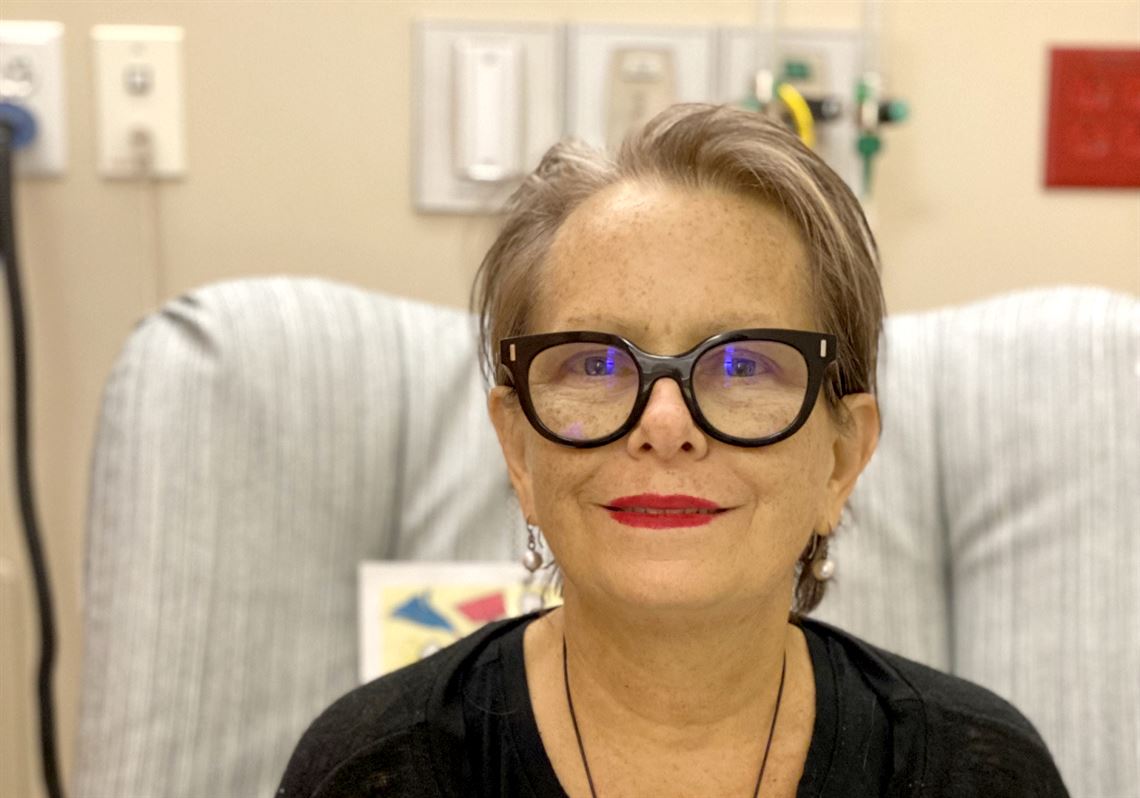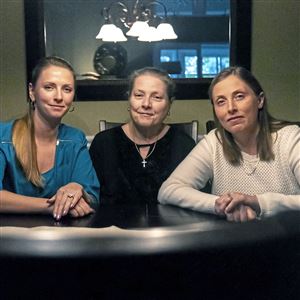Tica Hall was preparing to die. Her house, littered with mattresses, bustled with friends and relatives, and colleagues from around the world pinged in via Zoom to say their last goodbyes. The scent of what looked like a hundred flower bouquets perfumed each room of her house in Regent Square. She’d given away most of her clothes to loved ones, bought herself an urn and chosen the playlist for her memorial.
The breast cancer diagnosed in 2010, when she was 51 years old, had dissipated in 2012 but then returned in 2020, when doctors found a mass in her right lung and labeled it stage 4 metastatic breast cancer. Her first thought after hearing her cancer had recurred was of her son, Gabriel, a student at Bowdoin College in Maine. “I had this image that I wouldn’t be sitting in Maine watching him graduate,” she said, tearing up.
Doctors treated her with Ibrance and Letrozole, two chemotherapy drugs that held cancer at bay. She continued to spend time in her garden, work through the pandemic as a professor of psychiatry, psychology, and clinical and translational science at Pitt, and mentor her students. Then in May of 2021, she felt a twinge of back pain. She remained optimistic as she returned to the hospital the next day, thinking she might have appendicitis. Instead, she had liver failure: her liver had doubled in size in one month. After the only possible chemotherapy for her compromised state, Gemzar, proved not to be working, her doctors gave her two options: Die in the hospital or die at home.
She went home. It was a week into the death watch that some of her friends noticed she looked less yellow from the jaundice. “‘You look great’ is not something you usually hear on your deathbed,” she said. So she went back on Gemzar. A scan a few months later revealed her enlarged liver had shrunk — the drug seemed to be working after all.
In October, her doctor, Adam Brufsky, the medical director of the Magee Women’s Cancer Program, part of the UPMC Hillman Cancer Center and a professor of medicine at the University of Pittsburgh School of Medicine, ordered a genetic test and discovered that Hall had tested positive for HER2. HER2 is a protein that acts as a receptor, or docking site, and controls how breast tissue grows and divides. Too many HER2 receptors can tell cells to keep growing and lead to cancer.
Although anyone can develop breast cancer, it typically affects women. One in eight will develop breast cancer, and 20% of those will be HER2+, said Brufsky. People with breast cancer can be tested for their HER2 status, which, according to breastcancer.org, is broken up into HER2- (0, 1), borderline (2+), and HER2 3+, depending on how many receptors are present. Hall was initially categorized as being HER2-, but since her cancer had mutated and metastasized to her lung, liver and her skeletal system, she retested as positive. This meant she was eligible for a new treatment.
That treatment was Enhertu, a drug created to treat breast cancer and other metastatic cancers in patients who are treatment-resistant. Enhertu, by its hefty lab name trastuzumab deruxtecan, is the combination of an antibody, or protein (trastuzumab), bound to a chemotherapy molecule (deruxtecan). The combined effect allows the drug to target HER2 receptors specifically and deliver a lethal dose of chemotherapy to those cells — Brufsky called it “a magic bullet” — so it won’t work on patients who don’t have any HER2 cells.
The drug received FDA approval to treat HER2+ patients who had metastatic breast cancer in December of 2019, but wasn’t yet approved to treat patients with low levels of HER2 until May of 2022. Hall got her first IV injection of Enhertu on May 26.
Brufsky has been involved in a series of clinical trials for Enhertu called DESTINY-Breast. The most recent paper, which came out in July in the New England Journal of Medicine, found that Enhertu doubled patient survival and increased the length of time a patient remained progression-free, which means tumors persist but are not growing or spreading.
Brufsky called Enhertu’s success “exciting” and “dramatic.” The results of a recent clinical trial, DESTINY-Breast04, which was outlined in the paper, recruited 557 patients and was sponsored by the drug’s developers Daiichi Sankyo and AstraZeneca, expanded Enhertu’s use beyond just patients who were HER2+ or had other types of cancer. This means it can now help a whole new group of people who were previously ineligible for treatment: Brufsky said that 50% of people with metastatic breast cancer express low levels of HER2. Hall called Enhertu “truly a miracle drug.” On Aug. 10, it was approved for use in treatment-resistant non-small cell lung cancer in addition to metastatic breast and gastric cancer.
Side effects of Enhertu, similar to other chemotherapy drugs, include nausea, vomiting, a small decrease in a patient’s white blood cell count and hair loss in one-third of patients. But Enhertu also carries a slight risk (7% to 10%) of lung inflammation, which can progress into a dangerous condition called interstitial lung disease. In an early clinical trial, three patients taking Enhertu died from that side effect. Brufsky said that doctors now know to consider this in the list of possible complications, so they can catch it early. Symptoms include a dry cough and shortness of breath, after which doctors can order chest scans and put the patient on a steroid. Unfortunately, a patient who develops this complication could no longer take Enhertu.
The goal, said Brufsky, is to turn breast cancer into a chronic condition that people will be able to live with for many years.
“I think with Enhertu, we can do that,” he said. When he first started in the field, 27 years ago, 30% to 40% of women diagnosed with breast cancer developed metastatic breast cancer. Now that number is down by half, 20% to 25%, as scientists develop tools to catch and treat breast cancer earlier. He said this change has been the most gratifying part of his career.
Hall visits the hospital to get her Enhertu infusion every three weeks and gets another injection to strengthen her bones every three months. She said that on Enhertu, she has more energy, her hair is growing back (“I like my silver hair now,” she said, running her hand over her head) and “best of all, it’s working.” Recent scans showed that none of her cancer is progressing.
When she was dying, people asked her “What can I do?” She requested they send a card to her son, Gabriel, on his graduation day in May 2023. “I wanted him to be flooded with love,” she said. But she hopes to be able to attend his graduation after all.
“In cancer communities, some refer to this as a fight,” she said. “I do not. I prefer the metaphor of a journey.”
First Published: October 16, 2022, 10:00 a.m.




















